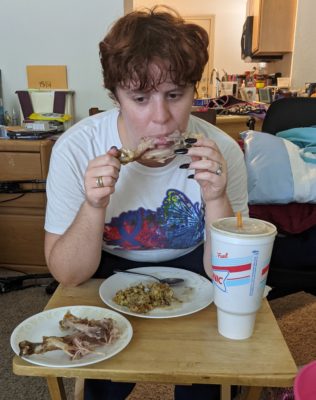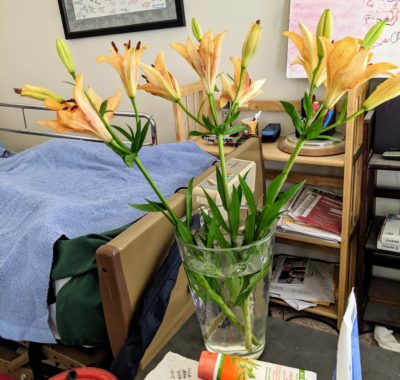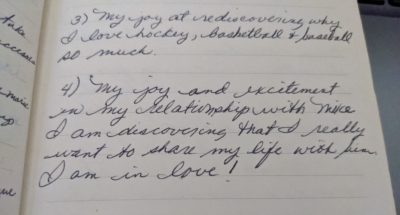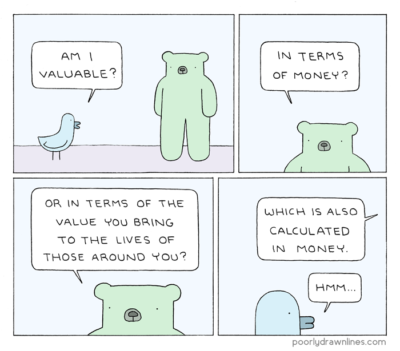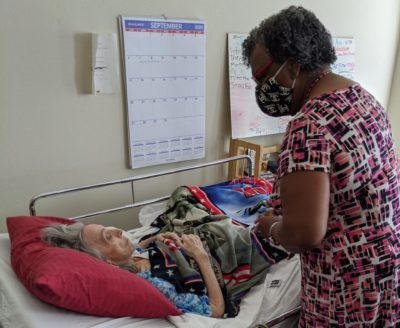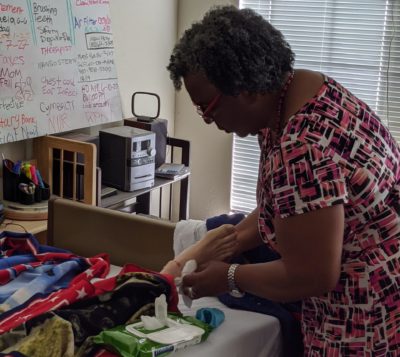This post describes, my recovery from the loss of my wife to a degenerative neurological condition called Huntington’s Disease. She was healed of this condition when she went to live with our Heavenly Father at 2:30AM, the 10th of January 2021. You can read the announcement here.
Or if you would like to read our story from the beginning, you can start with: How We Got Here…
Not much news this week on the home front – our futon arrived three days early and Frannie and I got it set up in three or four hours. Now if we have any visitors (?) they will at least have a place to sit. To tell the truth, I would have rather bought something used, but none of the Goodwill stores in the area accept furniture.
In other news, Frannie dropped the bomb on me in passing, that her boyfriend Leroy is coming up for a visit – no word on whether he is packing a ring…
❦ ❦ ❦ ❦ ❦ ❦
The term “reentry” of course comes from the American space program and refers to the process of coming home from space and reentering the earth’s atmosphere. As it turns out, actually being in space is not that difficult. Likewise, getting to space is not inherently very hard. Put enough thrust under anything and it ends up in space – even a red Tesla sports car. No, the really tricky bit is getting home in one piece – you’ll note that Elon isn’t trying to get his car back.
As a kid growing up in Missouri, I remember watching Walter Cronkite using a plastic model of the capsule to explain for the 900th time about a feared malfunction with the heat shield of John Glenn’s Friendship 7 Mercury space capsule, and how they hoped to minimize the risk of it falling off by not jettisoning the retrorocket pack. Their hope was that its retaining straps might help hold the shield in place.
I also remember interviews with Glenn afterwards in which he related the consternation he felt during reentry as he watched flaming chunks of metal hurtling past the windows of his capsule and wondered, “Was that the retropack burning up, or was it my heat shield breaking off?” As we discovered later with the Space Shuttle Columbia disaster, the heat of reentry is so intense that if it had been his heat shield he wouldn’t have had time to even finish that thought.
Recently, I have been thinking a lot about reentry as well. Not reentering the atmosphere from the vacuum of space, but reentering public life from the vacuum of caregiving. Though to be honest, I haven’t actually gotten as far as “reentry.” Right now I’m all about the “Preparing for…” phase of the process, and the first thing I noticed was that, with the exception of the airplane-like Space Shuttle, everyone who has ever gone into space has come home sitting backwards.
Which, if you think about it, is an interesting metaphor for life in general, and life post-caregiving in particular. As humans we seem to prefer to back into the future. For me, that posture is often more comforting because it means that I can be reassured by the sight of all the things that I’ve survived – which can be preferable to having to consider all the challenges and hills that there are still ahead of me. The unfortunate side effect, though, is that it makes it kind of hard to see where I am going. So, yeah, I guess that is one thing that I need to be working on.
In conjunction with that exploration, I have noticed something interesting about myself. I often say that if I ever created for myself a personal motto, it would probably be something along the lines of:
Just get started,
inspiration will come…
However, probably from the effect of living with Janet for 35 years I have become much more of a planner – though, from time to time, I still tend to start moving before I have a clear idea of where I’m off to. And while going through life “facing front” allows me to see opportunities and to be prepared for them as much as possible, it also allows me to see innumerable challenges fraught with all manner of potential problems.
For example, being out in the world means having to deal with people you don’t know and perhaps could be even someday, eventually, possibly, maybe, (gasp) dating. I have been out of the loop for so long that I don’t remember all the rules, and the ones I do remember are probably offensive to somebody now. All I know is that the last time I had to figure out “the rules” was Junior High – and that was a pain that I am not looking forward to repeating.
My best friend: “Hey Mike, I talked to Rebecca 4th period and she says she likes you.”
Me: “Hey, that’s great!”
Best friend: “Yes but, she also said that she doesn’t like you, like you…”
Me: “AAARRRGGGHHH!”
And add to that looming dread, the fact that while I can (with enough editing) come up with some pretty good written words, I am fundamentally not super comfortable speaking with people live or in online chats. So I am often left wondering, if we can send people to the moon, why can’t we figure out a way to edit the words coming out of our mouths? Like the time I called Janet by one of my ex-wives names in the middle of an argument. My, but that escalated fast…
But beyond any potential re-living of the bad old days of my youth, this last point brings up another topic. The world has changed a lot in the past couple years. Coming out of the bunker where I was caring for Janet I am finding a world that I at times don’t really like, or even recognize. So I begin asking myself questions like:
- How do I fit in?
- Can I fit in?
- Should I fit in?
With the third question being in many ways the most important. To begin with, the level of fear in society is unbelievable – and to me personally, intolerable.
Or again, people used to say, “You only have one chance to make a first impression.” Today, unfortunately, you seem to only have one chance – period. If in your entire life you have ever said anything that is troublesome to anyone, you are just done. There is no acceptance of misunderstandings and no tolerance for differing opinions, and even if you apologize for something that you acknowledge you were wrong about, there is certainly no forgiveness. Sometimes it all gets me thinking that perhaps sitting on my front porch and yelling at people who walk on my lawn wouldn’t be such a bad life. But do I really want to end up like Clint Eastwood’s character in Gran Torino?
This point ties in with another challenge I have been considering. As I grow older, I have noticed a tendency to become more introverted – a not uncommon situation. Recently, I was listening to a radio program that was discussing retirement, and they mentioned that introversion was a real problem in that context as well. The counselor leading the discussion said that too many people decide to simply withdraw from everything, and sit on their front porch in a rocking chair and watch the world go by. But as I have written before, that can kill you.
So with all these challenges in front of me, what am I to do? Well, I could turn back around, try to convince myself that the things I saw when facing the other direction weren’t real, and resume sliding into the future backwards. But for me it boils down to a rather old-fashioned word that people today like to ignore or redefine – Integrity. And as far as I can see there is only one thing that I can do with integrity, and that is to continue becoming who God made me to be. Who I am as a created being is what ultimately gives my existence meaning. As an engineer, I like to tell people that raw data is meaningless. The thing that gives it meaning – and therefore value – is its context. The proper context for my life is The One who created it.
Admittedly, figuring out who that person is can be a big challenge, but then only the big challenges are really worth tackling. It is only by learning who I essentially am that I can learn to let go of the temporary and accept what comes next. For example, the relationship that Janet and I had was the best that I could ever conceive. But that, in a way, is part of the problem: It’s the best that a human mind could conceive – I think I’d kind of like to find out the best that the mind which created the cosmos in all its amazing complexity and diversity could conceive. Now that could be interesting!
So the preparations continue…
In Christ, Amen ☩
❦ ❦ ❦ ❦ ❦ ❦
A prayer for when you are going through life sitting backwards…
“Blessed are You, Lord God, King of the Universe. It is right that I should at all times and in all circumstances bless You for the future that You have prepared for those who love You. But today I want to bless You especially for our ‘swivel seats.’ So often I feel afraid of the future, but You are eternally forgiving and patient. At any moment I can turn around in my seat and face ahead towards the future, fearlessly. Thank you. Amen.”


